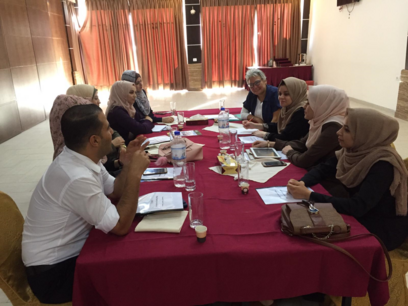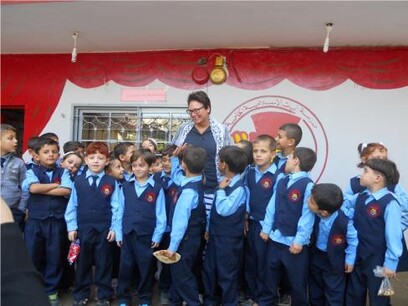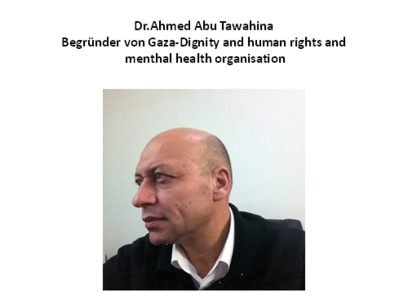Gaza Strip
Our team for non-violence in Gaza
When in 2015 Dr. Michaela Fried visited Gaza for the first time, an exciting journey began together with Dr. Ahmed Abu Tawahina. The two visited schools and saw parents and children to whom you told about the ideas of the New Authority and Nonviolent Resistance. We will forever remember the quote from a father of a family who said during a meeting: "I have understood. I don't know if I'll be alive tomorrow or if I'll be hit by a grenade tonight. But I can decide now that there will be no more violence in my family."
Interest grew, and with Dr. Tawahina sadly gone in early 2018, we lost a key supporter on the ground. His daughter Amani Tawahina, who is a trained interpreter, continues to run her father's institute and can build many bridges for us with her professional background.
Nevertheless, it became clear that it is necessary to build competencies on the ground so that the ideas and support services can be directly anchored in Gaza. In September 2019, a group of eight people started the "Coach for New Authority" training. As part of this training, participants receive regular group supervision sessions. These take place online and are conducted by eight supervisors from Australia, England, the Netherlands and Austria on a voluntary basis.
Since the beginning of 2020, the nine participants have already been active in practical work, accompanying families in challenging situations. It is great to see how quickly the dedicated "coaches" are able to accompany some families to a relieving everyday life.
After Michaela's last visit to Gaza in the autumn of 2022, our team in Gaza was able to be expanded to 18 enthusiastic employees. Our colleagues in Gaza met regularly via Zoom with the volunteers in our network to receive supervision and exchange ideas for supporting families and children in schools. Parents reported that refraining from violence in the family strengthened both the family system and their resilience, and sparked new hope for the future. While there could be no safe places in Gaza, our joint work with the Palestinian practitioners enabled parents to create emotionally and physically safer places within the family and at school.
Current situation since October 2023
With the ongoing disaster in Gaza and the collapse of our initial project, our positions have changed dramatically. We decided to set up a WhatsApp group with our colleagues in Gaza, which has since served as a protected space for sharing advice and encouragement. In this extreme situation, our strongest tool remains our presence.
A message from a colleague vividly describes the situation: ‘We are back online, we are still alive. We don't have the words to describe how exhausted we are... Why can't the bloodshed be stopped through peaceful, political dialogue? We just want to survive.’
For us, this work means staying in touch, being present, and showing our friends that they are not alone and have not been forgotten. Through ‘Containment,’ we help them process their emotions and share their lived reality. Through lectures, public statements, and sharing their stories, we bear witness to the human suffering we are experiencing first hand. This act of bearing witness gives our colleagues a voice and makes the suffering of the civilian population of Gaza visible. At the same time, we also stay in touch with our friends in Israel, who are also suffering from the current conflicts. Our aim is to promote dialogue and build bridges between the affected communities.
Support our work
Your donations make it possible for us to continue to support our colleagues in Gaza. Every contribution helps us to provide psychosocial support and maintain hope. Donate now.
We would like to thank the Spykman Foundation from the Netherlands for the financial support in the context of this training!

From a report by Michaela Fried:
Gandhi said: “An eye for an eye only ends up making the whole world blind”.
Nowhere have I seen that blindness more clearly than in the Gaza Strip. Violence by constant oppression from the outside (by the Israeli occupation) and violent conflicts within the country (through Hamas), which the civilian population have to suffer.
Unemployment of fathers, cramped living conditions, poverty, insufficient drinking water and a chronic shortage of food are also contributing factors.
Electricity shortages make living in dignity impossible, the result of which is that violence erupts all over the country, daily and hourly.
This is violence which comes from the macro-political system into education and also finds its way into the family system,
the smallest political entity.
Teachers in public schools are not motivated to break the spiralling violence because they are not well paid, and because they too are traumatised by poverty and violence.
There are however some private schools in Gaza which are supported by European countries, whose better-paid teachers want their schools to give children a feeling of safety. The words on their school banner: This is a nonviolent place!
20 percent of all children in Gaza are taught at such schools, a figure of about 80,000 children.
For two years we have been working with school leaders and teachers of these schools. We provide training for the teachers and parents of these students; they learn nonviolent communication and find ways of coming out of their helplessness, show a self-controlled attitude, make reparation and relational/reconciliation gestures; finally, they strive to jointly form a nonviolent connection to the children.
Our next step will be to train teachers in Gaza as “practitioners”, who will start spreading the idea of nonviolence from schools to families.
By taking culturally specific norms, values and attitudes into account in adapting the approach, participants of our training in Gaza will be able to help fathers accompany their children in making reparation for incidents of problematic behaviour, instead of beating them at home or in front of the class.
For people in Gaza, ‘disembarking from violence’ means getting a piece of their pride and dignity back.

Late Dr. Tawahina, our project partner till February 2018:
"Disembarking from violence means for the people here getting a piece of their dignity back, in a country where violence has been passed on for generations, violence especially against women and children has increased the suffering. The successes of our joint work is already apparent in a small (but remarkable) number of single families and in a few schools .
If we use this method to reduce the spiral of violence in our communities through the school and the family, this would be an incredible gift to this region of the Middle East.
Daily care and enough food, work, money for school attendance and the education and safety of the children here in this small part of the world - in reality the largest open-air jail on the planet - and it will not get any better if we do not act.
“I do not know if and when I will die”, “it could be the next attack”, “like my neighbours”.
“But I am changing, by adopting the approach of nonviolent resistance and by keeping our home (at least from the inside), a safe place”.
